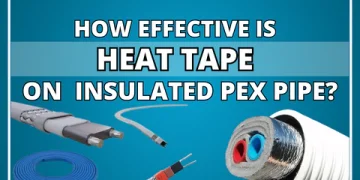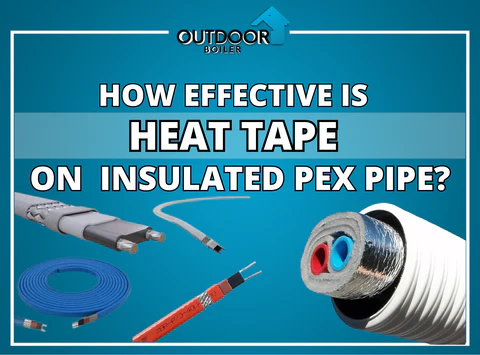What Happens if You Skip Insulated PEX Pipes for Your Outdoor Boiler?
Outdoor boiler systems are supposed to provide consistent, reliable heat to your home or outbuildings, especially as the temperatures drop. Have you ever thought about what not using insulated PEX piping for your outdoor boiler really means? Let’s consider some of the pitfalls to avoiding insulated piping and why using it is so important in terms of efficiency and effectiveness for your heating system.
The Purpose of Insulated PEX Pipe for Outdoor Boilers
The insulation of the outer boiler PEX pipe is especially suited for outdoor boilers as it will work out to minimize the transfer of heat while hot water circulates into your home from that outdoor boiler. In this situation, if not insulated, generated heat in the boiler leaks out into the soil and further increases loss of transferred heat into your house.The farther the distance between the boiler and your home, the more pronounced this loss becomes, forcing your boiler to work harder to compensate.
Instant Heat Loss and Inefficiency
Such piping loses a lot of heat due to lack of insulation. When water flows through such non-insulated piping, its heat is absorbed by the soil surrounding the piping to considerable amounts. In other words,
Higher Fuel Consumption: Your boiler has to run for longer periods and more times to maintain adequate temperatures, burning more wood, coal, or fuel.
Inconsistent Heat Delivery: Rooms may not reach the desired temperature, leading to a chilly, uncomfortable indoor environment.
Increased Wear on Boiler Parts: Continuous firing due to the inefficiencies strains the boiler system, which may lead to more frequent repairs.
Higher Operating Costs
You will pay more in operation if you heat your home with non-insulated PEX pipe. It means the boiler will have to burn more fuel in order to compensate for the lost heat, which increases your fuel costs directly over time. Non-insulated piping may seem like a cheap option at first, but additional fuel and maintenance costs will quickly add up. You may find that over a single heating season, these costs far surpass what you would have spent on insulated PEX pipe in the first place.
Impact of Low Efficiency on Environment
Using uninsulated pipes does not only leave a dent in your pocket but will also affect the environment. When your boiler must consume more fuel to compensate for heat loss, more emissions are then generated. With beechwood or coal, it doesn’t matter; badly insulated heating methods increase your carbon footprint and increase pollution.
Common Problems of Uninsulated Piping in Outdoor Boiler Systems
It can also lead to other heating challenges that might disturb your entire system. Here are some common issues homeowners experience without insulated PEX:
Winter Freezing of Pipes: If the pipes are not insulated, then freezing will freeze up the pipes. As water expands when it freezes, it can even break the pipes. That will take a lot of time and money to repair. Insulated pipes maintain the flow of water and keep the pipe free from cold temperatures.
Reduced Flow Rate: Heat loss within uninsulated pipes will also make the water in your system flow more slowly, especially over long distances. Reduced flow can cause inconsistent heating within your home as well as put strain on the pump.
Increased Maintenance Requirements: In this scenario, your boiler will be working harder as it will try to replace the heat lost. This increases stress on system components, hence more wear and tear on the parts, leading to higher maintenance costs and breakages.
Comparing Insulated PEX Pipe with Uninsulated: A Long-term Approach
Spending extra money on insulated PEX pipes is an added expense. However, it pays back in several ways:
Fuel Savings: It conserves fuel since it limits the amount of heat to be lost; hence the minimal amount of fuel that would keep your boiler warm.
Lower Maintenance: With less strain on the boiler, you’ll spend less on maintenance and replacement parts over time.
Reliable Heating: Insulated PEX allows the heat generated by your boiler to effectively reach your home without major loss, thereby providing consistent warmth and comfort.
The Hidden Costs of Shunning Insulated PEX for Outdoor Boilers
Skipping an insulated PEX can provide secret costs that appear at strange times:
Added utility cost: This may be a result of the higher electricity usage through pumps and fans associated with working harder on your boiler side.
Replacement Costs: An overworked boiler system that is always inefficient will degrade faster. This will require early replacement, a costly affair that could have been avoided by insulating the piping.
Time and Effort: If an inefficient heating system is maintained frequently, checks and adjustments take a lot of time, especially during peak heating seasons.
Insulated PEX Pipe—A Necessity for Efficiency and Comfort
While cutting cost on insulation sounds very attractive initially, the cost of uninsulated piping can cost a fortune in the long run. Insulated PEX pipe for the outdoor boiler will maximize delivery of heat, reduce operating cost, and optimize your system generally. Finally, it will be just a matter of better performance as the money and environmental impact payback will result from insulated PEX. To keep your heating system running optimally and avoid the pitfalls of non-insulated piping, consider upgrading to insulated PEX and experience the benefits of efficient, effective heating all winter long.
When to Upgrade to Insulated PEX Pipe
If you’re currently using uninsulated pipe and noticing high fuel consumption, inconsistent heating, or frequent maintenance, it may be time to upgrade. Insulated PEX pipe is designed for durability and efficiency, providing a stable heating solution for the long term. The initial investment is often offset by the savings you’ll gain in fuel, repairs, and peace of mind.
You can also visit OutdoorBoiler.com to select some of the highest quality insulated PEX pipes for your outdoor boilers in order to maximize heat retention.

























